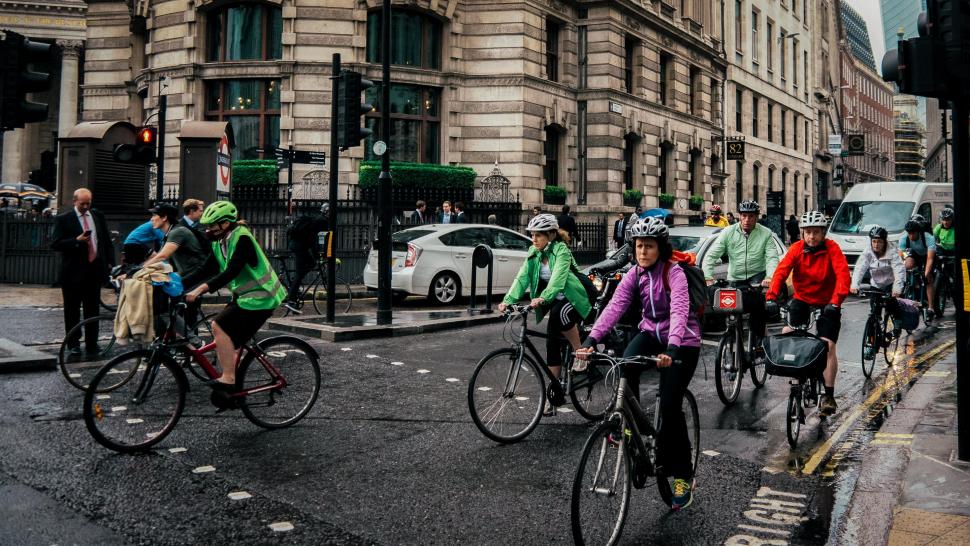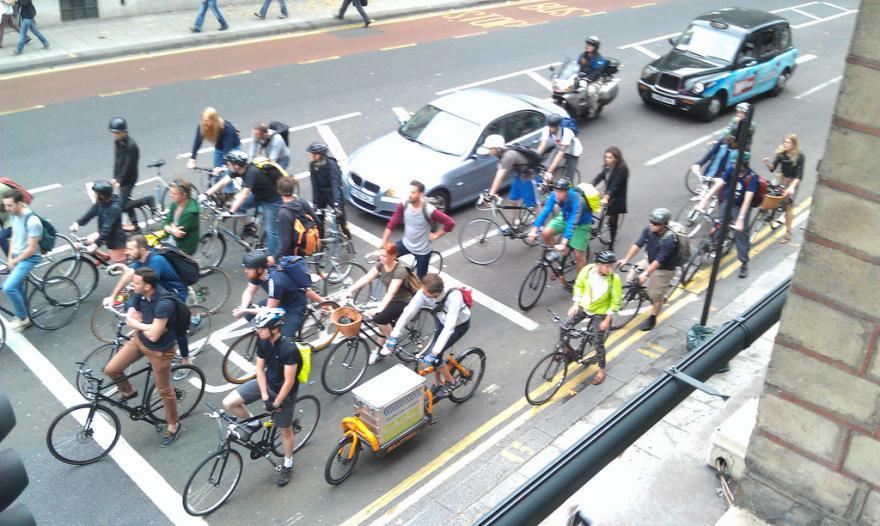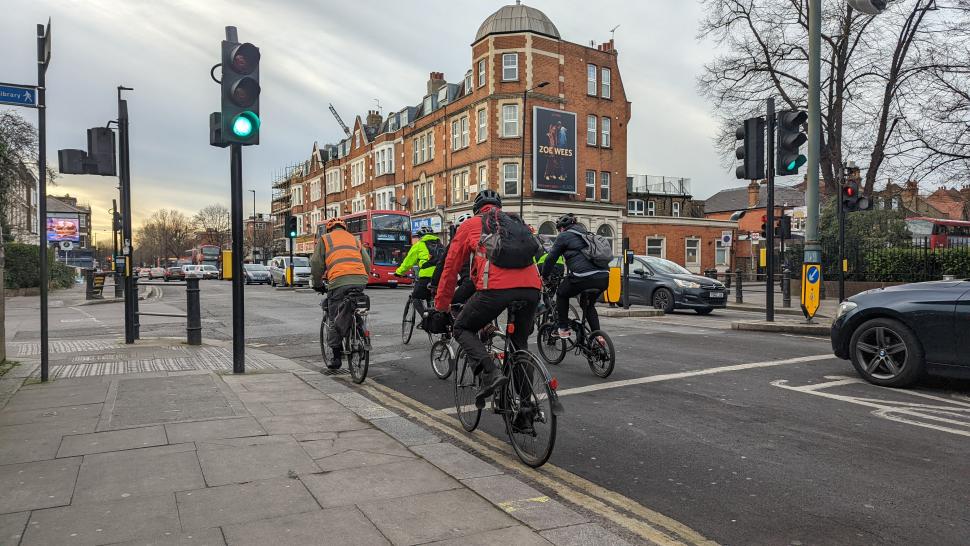- News
- Reviews
- Bikes
- Accessories
- Accessories - misc
- Computer mounts
- Bags
- Bar ends
- Bike bags & cases
- Bottle cages
- Bottles
- Cameras
- Car racks
- Child seats
- Computers
- Glasses
- GPS units
- Helmets
- Lights - front
- Lights - rear
- Lights - sets
- Locks
- Mirrors
- Mudguards
- Racks
- Pumps & CO2 inflators
- Puncture kits
- Reflectives
- Smart watches
- Stands and racks
- Trailers
- Clothing
- Components
- Bar tape & grips
- Bottom brackets
- Brake & gear cables
- Brake & STI levers
- Brake pads & spares
- Brakes
- Cassettes & freewheels
- Chains
- Chainsets & chainrings
- Derailleurs - front
- Derailleurs - rear
- Forks
- Gear levers & shifters
- Groupsets
- Handlebars & extensions
- Headsets
- Hubs
- Inner tubes
- Pedals
- Quick releases & skewers
- Saddles
- Seatposts
- Stems
- Wheels
- Tyres
- Health, fitness and nutrition
- Tools and workshop
- Miscellaneous
- Buyers Guides
- Features
- Forum
- Recommends
- Podcast
news
 Cyclists in London (image: Tomek Baginski on Unsplash)
Cyclists in London (image: Tomek Baginski on Unsplash)Almost half of British people can’t afford to buy a bike – and a quarter say it would take at least six months to save for one, new research for Cycle to Work Day finds
A new study, conducted to mark Cycle to Work Day on 1 August, has found that almost half of UK-based consumers believe that they cannot afford to buy a bike, with a quarter noting that it would take at least six months for them to save for one.
The survey, carried out by Cycle to Work provider Cyclescheme’s parent company BHN Extras, as part of its annual research into the attitudes and perceptions of, and barriers to, cycling in the UK, also suggests that the costs of accessories, along with concerns about a lack of fitness and “fitting in” with other cyclists, acts as a deterrent to encouraging more people to ride their bikes to work.
However, despite these concerns, the study also found that the number of people cycling to work is rapidly growing, with almost a third of those consumers surveyed commuting by bike, up from 19 per cent last year.
Carried out by BHN Extras and Cyclescheme, the UK’s largest provider of access to the Cycle to Work scheme, the government’s tax-friendly initiative which has for the last 25 years enabled people to buy a bike and accessories through salary sacrifice, the survey aimed to highlight how the UK feels about cycling and active commuting ahead of the 11th edition of Cycle to Work day on 1 August.
Gathering responses from 2,000 people employed across a range of sectors in the UK, almost two-thirds of whom were aged between 25 and 54, the study found that 49 per cent of those surveyed are not currently in a position to buy a bike outright.
A quarter of those consumers, meanwhile, also stated that it would take at least six months to save to purchase a bike, with 50 per cent noting that they would be most likely to buy a bike by splitting the cost.
Recent research from the Bicycle Association has found that the average price of bikes being sold has risen a staggering 26 per cent since 2019, with – as we reported last year – entry level road bikes such as the Specialized Allez jumping from £600 to £1,100 in the past decade, perhaps owing to some people’s reticence to spend their earnings on a new mode of transport.
Perhaps unsurprisingly, not owning a bike was the biggest barrier to cycling to work for 22 per cent of respondents, while the same percentage claimed that the cost of bikes and accessories acted as a deterrent for potential cycling commuters.
For those who don’t currently cycle, long commutes, a lack of fitness, and concerns about accessibility represent the main barriers to riding to work, with almost half (46 per cent) stating that they are worried they aren’t fit enough to ditch the car and commute by bike.
And with concerns increasingly being raised about sexist abuse and misogyny directed at female cyclists, the perception of cycle commuting being tailored towards young males who live in big cities also stands out as a persistent barrier to cycling, with 58 per cent of respondents believing that they “don’t fit the bill” of what a cyclist represents.
Nevertheless, the survey also found that the popularity of cycling to work continues to grow. 32 per cent of consumers surveyed currently cycle to work – up from 19 per cent the previous year. This percentage could grow further yet next year, with 34 per cent of consumers considering introducing cycling to their commute.
42 per cent also noted that cycling could cover at least part of their commute to work, and – in the kind of numbers likely to be welcomed by Cyclescheme – 67 per cent said they’d be more likely to start cycling if their employer provided support.
Finally, the research found that three quarters of those who cycle agree that they discovered several more benefits since they started than before, and that 47 per cent of people believe that cycling will have the biggest impact on their mental health.
“It is clear that people want to cycle to work and with it being the 25th anniversary of the Cycle to Work Scheme and an Olympic year – the timing could not be better,” Adrian Warren, a senior director at BHN, said in a statement announcing the survey.
“But there are also barriers that need to be addressed. Whether it’s the upfront cost of bikes, levels of fitness, or feeling like you’re not the ‘typical’ demographic, cycling has significant benefits from better mental health and less impact on the environment.
“It’s interesting that so many people said they would be more likely to cycle if they had support from their employers. There is cost effective support out there that can help overcome many of the barriers. Cycle to Work Schemes for example, are offered through employment and help to spread the cost of bikes and accessories through salary sacrifices.”
Meanwhile ex-England rugby captain, World Cup winner, and keen cyclist Jason Robinson added: “Physical health has always been a huge part of my life, but it can be hard to fit it into a busy schedule.
“For many, cycling to work can be a convenient way to build exercise into their daily routines. Not fitting the typical demographic might be off putting for some but cycling is an activity for all, no matter where you live, your age or fitness ability – everyone can make the most of the many benefits associated with cycling.”
The 2024 Cycle to Work day, its 11th edition, comes after a turbulent year for both Cyclescheme and the Cycle to Work initiative in general.
In January, the Association of Cycle Traders (ACT) and senior figures from cycling retailers met with MPs from the All Party Parliamentary Group for Cycling & Walking (APPGCW) to make their case about the “need for urgent systematic change” to Cycle to Work scheme, arguing that the scheme as it currently stands is “too complicated”, damaging to retailers, and no longer fit for purpose to get people cycling to work.
The meeting came two months after the ACT and bike shops hit back at Cyclescheme, the initiative’s largest provider, for deciding to prevent retailers from charging additional fees on bikes purchased under the scheme, a move described by the representative of independent cycle retailers at the time as “infuriating”, “incredibly short-sighted”, and the “straw that broke the camel’s back”.
After obtaining a PhD, lecturing, and hosting a history podcast at Queen’s University Belfast, Ryan joined road.cc in December 2021 and since then has kept the site’s readers and listeners informed and enthralled (well at least occasionally) on news, the live blog, and the road.cc Podcast. After boarding a wrong bus at the world championships and ruining a good pair of jeans at the cyclocross, he now serves as road.cc’s senior news writer. Before his foray into cycling journalism, he wallowed in the equally pitiless world of academia, where he wrote a book about Victorian politics and droned on about cycling and bikes to classes of bored students (while taking every chance he could get to talk about cycling in print or on the radio). He can be found riding his bike very slowly around the narrow, scenic country lanes of Co. Down.
Latest Comments
- Muddy Ford 3 sec ago
I agree. I would rather that punishment for close passes was more enforced and harsher, than have a shared path installed along my commute. I don't...
- Smoggysteve 45 min 10 sec ago
Electromagnets. Means you need a power source. Not the same. 🤦🏻♂️
- wtjs 1 hour 11 min ago
She clearly had no idea that she was doing anything wrong and had therefore decided I was being some kind of letch...
- Steve K 1 hour 47 min ago
It's worse than that - it is 50% heavier than they claim
- chrisonabike 2 hours 1 min ago
Thanks for the review! If it's this one it appears to be the Cyclops design (compare that to the Dutch urban cycle-priority roundabout here)....
- Cycle Happy 2 hours 16 min ago
Disable the speaker in two air tags. Very easy to do and numerous How To videos on YouTube. Then put a dead battery in one of the tags and leave it...
- belugabob 3 hours 19 min ago
Tiny little pencils?
- wtjs 3 hours 19 min ago
They were not playing ball at first, but I think saying he was going to go at 11am on Monday forced their hand and made it difficult to ignore ...
- ChasP 4 hours 45 min ago
I would imagine just to be able to sit down, if they wanted to pedal they could just get a bike?
- mdavidford 6 hours 20 min ago
Harsh on Ryan, but OK...



Add new comment
74 comments
Research like this is primarily about generating publicity for the commissioning organisation - it's probably not worth thinking too deeply about the results.
When they say 34% of people cycle to work (!!!) and the 2021 Census reported 2%, it puts the quality of their data in perspective
Yup. Several handfuls of salt for almost any surveys. Some you need more for of course.
I learned a long time back that surveys just collect "opinion". But a lot of the time you'll only get results from people who've got (a) a bee in their bonnet or (b) too much time on their hands or (c) both. Most people have got much better things to be doing!
Plus where you're gathering opinion on stuff that people actually have not really considered before, or is actually orthogonal to their lives the answers can be pretty wild. And most people just don't think about cycling at all apart from maybe the odd "cyclists in the way again".
Consider - "Tell me - is the reason you don't kiss marmosets due to a) lack of marmosets b) you prefer squirrels c) you've already got a pet ...".
Anything to do with the "why" can also net some misleading impressions, because a) humans can be surprisingly poor at understanding our motivations b) we can often be primed to describe how we wish others to see us.
(d) HR policies.
(e) E.Coli
Obviously people prefer squirrels to marmosets - why on earth would you need to ask people that?
Definitely nothing to do with our sponsors...
Brilliant 👏.
Yes that was the 'fact' that struck me.
34% of people cycle commuting is miles off reality.
Doesn't that become a bit chicken-and-egg, though?
John Smith already spends a proportion of his income on owning a car. He'd like to ride a bike, and possibly even commute to work, but he can't buy a new bike because he already spends a high proportion of his income on owning and running the car that he currently 'needs'*.
He doesn't even consider buying a cheap second-hand bike because the media always tells him that new is better.
*Don't let's get into whether or not 'need' actually means 'need'.
OT but more general version:
Substitution is easier with public transport...unless you buy an annual season ticket and then you have to sort out the timing.
I recall from many years ago it took me a long time to make the transition from using public transport to cycling to work because of figuring out how to deal with all the faff of showering, changing in the office, what to do with clothes, transporting everything including IT, getting a locker, building pass for the bike storage area etc. It was really a culture shift as much as anything else, and I was someone who cycled regularly at weekends and did tours prior to that, so for someone who doesn't cycle regularly it probably shouldn't be underestimated what the barriers are, but the cost of a bike might not actually be the issue at all.
As a matter of interest, does anyone make suitcase and briefcase for bikes now? I still have an Altura briefcase that took my laptop and papers plus an Altura suitcase - I could pack a suit that folded over neatly plus shoes, shirt, tie and wash gear. They went on Topeak rack on a touring bike. I'd ride up to 30 miles to meetings across London and be the smartest person in the room after others arrived frazzled by car or public transport and no shower
He's probably got a bike in the back of his garage or garden shed. Lots of people with cars also have bikes (often unused). Most bike riders also have car in household (eg children) or are, themselves, drivers (eg me having to drive wife and her friends around as she has injuries (hit by runaway motorbike) that restrict walking and prohibit cycling
Few. In London, car ownership is quite low though you wouldn't know it from our street. But we have mostly excellent public transport and can walk most places in 90 minutes. Out of town visiting friends and I'm usually surprised how unpleasant it is to walk, uselessness of public transport, horrible single carriage A roads
Pages